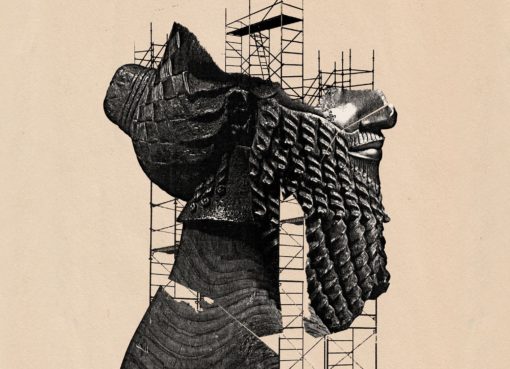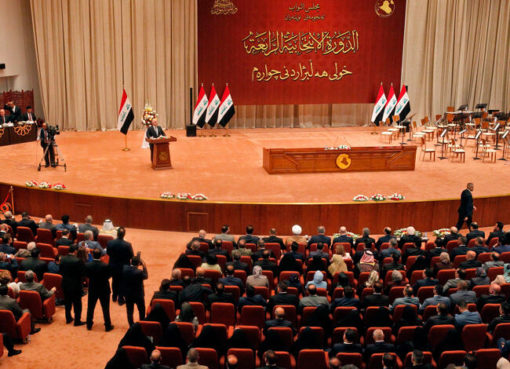
For half a century before its 2003 regime change, Iraq experienced escalating levels of authoritarianism that increased with the passing of time and the change of successive governments. A Coup d’état was the only possible method of regime change. What began as a benevolent dictatorship in 1958 soon turned into an increasingly oppressive sectarian rule between 1963 and 1979, and this latter transformed into an absolute tyranny under Saddam Hussein’s family rule that even a coup d’état became impossible. It took a coalition of nations, led by the United States of America, to impose a regime change by military means.
The framers of Iraq’s new constitutional system were heavily influenced by the country’s past experience with authoritarianism and acted out of fear more than hope: they invested all their genius in closing all possible loopholes that might lead to the emergence of a dictator in the future. In so doing, they ended up creating an anemic executive institution whose chief, the Prime Minister, lacks most of the powers that allow him to govern.
Nationally, Iraq is a federal state without a clear definition of its federalism. Each part of Iraq interprets, and practices, federalism in any fashion it can get away with. The northern region, ruled independently by the Kurdistan Regional Government (KRG) was acknowledged by the new constitution as an autonomous region with the same privileges that existed before 2003, and it acquired more measures of autonomy in the past years. By contrast, other regions are living under a de facto centralized arrangement where Baghdad decides every aspect of their local governance. The definition of federalism in the Kurdish north, defined as a virtual independence from Baghdad, fades to levels of non-existence in the southern province, Basra, whose local governance is decided by the central government and the local politicians who are subservient to large political parties and leaders from Baghdad.
In this confused environment, national politics and the outcome of governance are decided by a simple method, corrupt political deals made under the influence of duress and blackmail.
The KRG, armed with a very effective lobbying effort and an international sympathy for the suffering of Kurds under the murderous Ba’thist regime, has managed to convince the world that the situation in Iraq has not changed after 2003. The constitutional arrangement they secured, thanks to international meddling and incompetent negotiators on the other side, allows them a great room to maneuver. The Kurdish leadership also use the issue of independence as a highly effective blackmail tool in their continued negotiation with Baghdad. In their entire post-2003 political participation, the Kurds showed no evidence of concern about anything happening in the rest of Iraq. If anything, the cascade of security and political crises in the country were viewed by the Kurds as political opportunities to advance their position as a virtually independent state whose only relation with Baghdad is the 17% of the annual national budget they claim as their share. They support their position by applying pressure on the rest of Iraq from their own region and augment that with influencing the national government’s decision by their representatives in the Iraqi Cabinet and Parliament who take part in the national decision making.
The Sunni Arabs are another political entity who also use blackmail as a favorite political method. But theirs is a more lethal form of blackmail. Their political talking point is that the only alternative to a satisfactory Sunni empowerment, however unreasonably they decide that, is terrorism throughout their region. Since losing power in Iraq, which they held almost exclusively since the creation of the modern state, The Sunni Arabs, backed and encouraged by the regional Arab states, categorically rejected a regime change that granted them their fair share as a minority in the country. Since 2003, a Sunni politician in Iraq would support the government as long as he is in a high position, but the moment he is replaced by a political process or losing an election, he would go back home, gather his armed tribesmen and declare war on the government under the banner of Sunni marginalization. Except for a few Sunni leaders, who chose terrorism from the start, all the so-called Sunni opposition leaders who fought the government have been through the revolving doors of Iraqi politics. In the past, their pernicious practice was less devastating as they allowed a manageable level of terrorism inflow into their regions and they remained in charge of the local control, but their cynical behavior became self-destructive in 2014, when they allowed their regions to fall in the hands of the worst fathomable terrorist organization, the Islamic State in Iraq and the Levant (ISIL or Da’ish).
Once firmly in control of the Sunni Arab territories, Da’ish abolished the status of all local Sunni tribal Shaykhs and notables and forced them to pay allegiance to its own terrorist leaders, many of whom are foreign. The only local Sunni leaders who retained their voice were those who managed to flee to Arbil (hosted by the KRG) or to neighboring Arab countries, leaving their population divided as internally displaced people living in subhuman conditions or captives in the Da’ish-controlled territories, while their provinces were turned into a war zone. Instead of displaying any remorse for their devastating hubris, Sunni Arab leaders are still blaming everyone but themselves for what their immature political conduct brought on their community. They also still stick to their tired method of blackmail: telling Baghdad to choose their way or endless terrorism.
The Shia of Iraq are yet another contributor to the Iraqi crisis. Since 2003, the sectarian nature of Iraqi politics ascribed an exclusive clique of corrupt politicians and political parties to represent the Shia, none of whom can be accused of possessing any trace of statesmanship. They succumbed to their corruption, creed, criminality, and complete lack of any sense of responsibility and destroyed a centuries-long legacy of rightful Shia claim to assume a leading role in governing the country as a democratic majority. Post-2003 Shia leaders have been so incompetent, they had no idea how to become successful democrats, and when they tried to act as dictators they also failed.
The Shia community in Iraq, having taken the blame for the failure and corruption of their leaders, of which they are the primary victims, finally decided to act. In the past months, major Shia cities have been the theater of mass protests, and most recently, angry Shia protesters sacked the Green Zone twice, occupying the Parliament and the Council of Ministers buildings, as politicians fled through secret exits. In the red zone, the rest of Iraq, headquarters of major political parties became a fashionable target of protesters. What is appalling in the behavior of Shia political leadership is that they stand in total denial and refuse to acknowledge their destructive role in the continued crisis. Instead, they accuse their Shia constituents of being Ba’thists, outlaws, and hooligans.
(*)Dr. Abbas Kadhim is an Iraqi-American academic specializes in Iraq, Iran, Persian Gulf, and Islam. He is a senior fellow at the Foreign Policy Institute, SAIS- Johns Hopkins University and the President of the Institute of Shia Studies in Washington, D.C. He earned a Ph.D. in Near Eastern Studies from the University of California, Berkeley in 2006. He is the author of Reclaiming Iraq: the 1920 Revolution and the Founding of the Modern State, Univ. of Texas Press, 2012; and “The Hawza under Siege: A Study in the Ba’th Party Archives“, Boston Univ., 2013.
Source: http://www.abbaskadhim.com/?p=576








Comment here